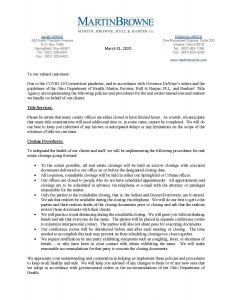May 4, 2020
The Ohio Bureau of Workers’ Compensation has complied a list of Q&As related to COVID-19’s impact on BWC operations. The document can be accessed here and is updated frequently. As always, the attorneys at MBHH are available to answer any questions you may have regarding the ongoing coronavirus pandemic.
Apr 24, 2020
MBHH Partner, Randall Comer, can often be found enjoying the great outdoors on his bicycle. Nice weather even calls for a bike ride to and from the office. In addition to the health and environmental benefits, Attorney Comer believes that the bike trails can offer a boost to the local economy. Please read this article for more information on Springfield as a hub along the Miami Valley Bike Trails.

Apr 2, 2020
To our valued customers:
Due to the COVID-19/Coronavirus pandemic, and in accordance with Governor DeWine’s orders and the guidelines of the Ohio Department of Health, Martin, Browne, Hull & Harper, PLL, and Bankers’ Title Agency are implementing the following policies and procedures for the real estate transactions and matters we handle on behalf of our clients:
Title Services:
Please be aware that many county offices are either closed or have limited hours. As a result, we anticipate that many title examinations will need additional time or, in some cases, cannot be completed. We will do our best to keep you informed of any known or anticipated delays or any limitations on the scope of the evidence of title we can issue.
Closing Procedures:
To safeguard the health of our clients and staff, we will be implementing the following procedures for real estate closings going forward:
• To the extent possible, all real estate closings will be held as escrow closings with executed documents delivered to our office on or before the designated closing date.
• All in-person, roundtable closings will be held in either our Springfield or Urbana offices.
• Our offices are closed to people who do not have scheduled appointments. All appointments and closings are to be scheduled in advance via telephone or e-mail with the attorney or paralegal responsible for the matter.
• Only the parties to the roundtable closing, that is, the Sellers and Buyers/Borrowers, are to attend. We ask that realtors be available during the closing via telephone. We will do our best to get to the parties and their realtors drafts of the closing documents prior to closing and ask that the realtors review those documents with their clients.
• We will practice social distancing during the roundtable closing. We will greet you without shaking hands and ask that everyone do the same. The parties will be placed in separate conference rooms to minimize interpersonal contact. The parties will also not share pens for executing documents.
• Our conference rooms will be disinfected before and after each meeting or closing. The time needed to accomplish this task may prevent us from scheduling closings too close together.
• We require notification by any party exhibiting symptoms such as coughing, fever, or shortness of breath – or who have been in close contact with others exhibiting the same. We will make reasonable accommodations for that party to execute the closing documents.
We appreciate your understanding and cooperation in helping us implement these policies and procedures to keep us all healthy and safe. We will keep you advised of any changes to them or of any new ones that we adopt in accordance with governmental orders or the recommendations of the Ohio Department of Health.

Mar 31, 2020
Ohio Amended Substitute House Bill 197
Ohio passed legislation to address the coronavirus pandemic. Highlights of the new law impacting you and your business include the following:
- Extends tax filing deadline to July 15;
- Provides for mail-in ballots for the primary until April 28;
- Waives the one-week waiting period for receiving unemployment benefits during the COVID-19 emergency;
- Allows the Director of Job and Family Services to eliminate the requirement that people receiving unemployment must actively seek suitable work;
- For contributory employers, unemployment benefits paid due to the COVID-19 emergency will be mutualized and thus not charged to contributory employers’ accounts;
- Ohio Department of Jobs and Family Services will waive penalties for late reporting and payments during the COVID-19 emergency;
- Prohibits public water systems from shutting off water to customers due to non-payment;
- Extends the validity of most Ohio-issued licenses to no later than the earlier of either ninety (90) days after the COVID-19 emergency ends or December 1, 2020;
- Suspends the statutes of limitation for criminal and civil actions, as well as time requirements for jury trials in criminal cases, as well as juvenile, domestic relations, and general civil matters; the suspension ends the earlier of either the end of the COVID-19 emergency or July 30, 2020;
Martin Browne, will continue to monitor these situations and provide updates as necessary. Our attorneys are on hand to answer your questions and provide guidance on how to navigate these critical issues. Please contact Shannon Wahl, Randall Comer, Steve McCready, or Dina M. Cary of Martin Browne’s Labor & Employment Practice group.
This post is not intended as a substitute for professional legal advice. If you have any questions about this information, please contact an attorney at Martin, Browne, Hull & Harper, P.L.L. at 937-324-5541.
Mar 30, 2020
HR 748, Coronavirus Aid, Relief, and Economic Security Act (CARES)
Here is the third major piece of federal legislation enacted to address the coronavirus pandemic. Below are highlights of the new law that may affect you, your businesses, and your employees now, soon, and later.
Now:
• Can defer paying fifty percent (50%) of Social Security payroll tax due for 2020 and 2021.
• Can immediately monetize tax losses.
• Extends the federal tax filing deadline to July 15.
• Foreclosure of federally-backed home mortgages blocked for at least 60 days.
• Evictions banned at properties connected to the federal government.
Soon:
• Small Business Administration (“SBA”) loans and grants that apply to businesses negatively affected by the coronavirus and Covid-19, including but not limited to, hotels, restaurants, and non-profits.
o Provides $350 billion in small business loans for businesses with less than 500 employees, including self-employed, to pay for payroll, rent, and utilities; loans become grants if loans are used as such (maximum loan of $10 million).
o Increases SBA Express loans amounts from $325,000 to $1 million and reduces time to receive loan.
o Increases eligibility for Economic Injury Disaster Loans (“EIDL”), including to sole proprietorships and private non-profits; removes requirement for loan guarantees on amounts less than $200,000; authorizes $10,000 advance when qualified and requested, which may not require repayment.
• Allocates $150 billion to support hospitals and healthcare workers; outlines accelerated payments for rural hospitals and those serving vulnerable populations (i.e., children’s hospitals) when elective procedures are suspended.
• Large employers can receive loans from the Secretary of the Treasury.
o $454 billion available, with conditions, including:
– Must keep 90% of workforce through September and no outsourcing or moving overseas for two years.
– May not break union agreements and must stay neutral if union attempts to unionize.
– Executive pay and benefits limited; no ability to repurchase stock or pay dividends.
• Tax rebate checks of $1200 per adult whose most recent Adjusted Gross Income is no more than $75,000 (filed singly), $112,500 (filed as head of household), or $150,000 (filed married jointly). Payment amount decreases as AGI increases above the limits. Qualifying adults will receive $500 per child under age 17 for whom a child tax credit was claimed on most recent taxes. This is a tax credit for 2020.
• Increased unemployment eligibility, maximum time to receive unemployment (39 weeks v. 26 weeks), payments increased by $600 per week. Freelance and contract workers may receive benefits.
Later:
• Fifty-percent (50%) employee retention tax credit against what employers pay in Social Security payroll taxes, up to $10,000 per employee.
Martin Browne attorneys are on hand to answer your questions and provide guidance on how to navigate these critical issues. Contact us at (937) 324-5541 or www.martinbrowne.com.



